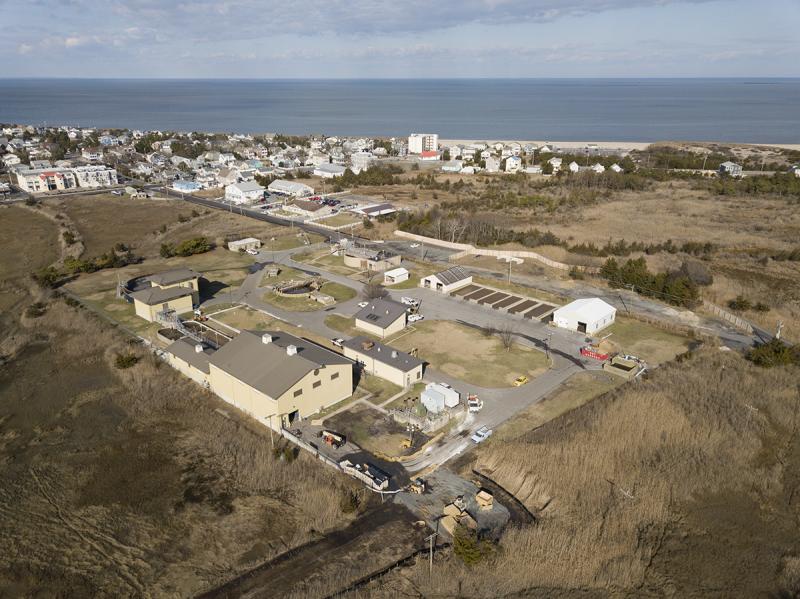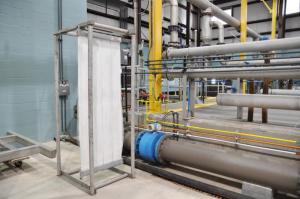Lewes BPW piecing together cause of wastewater fiasco
State and city officials are piecing together just what went wrong at the Lewes wastewater treatment plant that resulted in nearly 5 million gallons of partially treated effluent being discharged into the marsh, Lewes-Rehoboth Canal and lower Delaware Bay.
Officials believe the problem began with failed turbidity meters, which check the quality of water before it is used to backwash the plant’s filters, but an investigation is ongoing.
The malfunction Dec. 18 forced plant operator White Marsh Environmental Services, a wholly owned subsidiary of Tidewater Utilities Inc., to bypass the wastewater treatment process. Initially believed to be minor, the issue turned out to be much more major, clogging all of the facility’s filters, and the facility was taken offline for about 10 days until replacement filters could be delivered from Canada.
The facility was back online Dec. 28, and crews continued to clean the old filters to be placed back into the system for redundancy. But another malfunction Jan. 1 forced White Marsh to bypass the system again. While it only last two hours, DNREC issued a press release Jan. 2 to alert the public.
On Jan. 7, the Lewes Board of Public Works announced a joint investigation with Department of Natural Resources and Environmental Control and the City of Lewes into the the facility’s recent failures.
Filters were old
The facility on American Legion Road underwent $12.5 million in upgrades more than a decade ago, including the installation of zenon filters in four parallel channels in 2007. General Manager Darrin Gordon has stated at past meetings that the filters have a 10-year lifespan. BPW President Pres Lee confirmed the filters now being replaced are the original filters. However, he said, he doesn’t believe the age of the filters was a factor in the recent situation. He said the 10-year lifespan is not quite accurate.
“That’s the guarantee period,” he said. “We’ve talked to operators who say they can last longer.”
In a 2016 annual report, then-plant operator Severn Trent informed the BPW that the filters were near the end of their life expectancy and recommended buying new filters.
“These units have a long lead time and [Severn Trent] recommends ordering these so that they can be on hand for replacement when the others fail,” the recommendation reads. “[Severn Trent] will continue to routinely repair the membranes to extend their life.”
Severn Trent had been plant operator for 13 years before the BPW voted to switch to White Marsh in February 2017.
Lee said the BPW had budgeted money to replace the filters in the upcoming fiscal years. Last year, the BPW initially budgeted $625,000 for the current fiscal year for filter replacement, but only $25,000 was earmarked in this year’s budget. The current budget pushed replacement of the filters back to the 2020-2021 fiscal year, where $990,000 was budgeted for filter replacement.
Lee said the BPW has enough money in reserves to purchase replacements for all four units. The first set purchased last month was about $250,000, Lee said. The BPW had about $12.7 million in reserves when the 2020 budget was approved in April.
“Having this cash reserve allows us to respond quickly instead of scurrying,” he said. “We will have to realign our budget, but that’s not a big deal.”
He said budget amendments will be discussed at future meetings.
European-based company Suez manufactures the filters, Lee said, and the most recent filters acquired by the BPW had recently arrived in Canada via a ship from Europe.
Lee said a Canadian technician who works for the manufacturer was in Lewes this week to discuss his company’s filters and provide recommendations to ensure they operate properly.
The filters look much like a compact unit of spaghetti strings. Each string has pores that effluent flows through, removing nutrients and organics. Occasionally, Lee said, the system backwashes to clean the filters. It was during this process, it is believed, that the system malfunctioned.
Turbidity meters monitor the water quality as effluent exits the filters. Lee said it’s believed the meters malfunctioned and allowed dirty water into a backwash cycle, which clogged the filters.
Lee said turbidity meters may have to be replaced, and they are also considering adding a meter in the facility’s clean water tank to monitor water quality and trigger a shutdown if water quality doesn’t meet specified numbers.
The turbidity meters in the plant are the originals, Lee said, but they’ve undergone regular maintenance and parts have been replaced as needed.
New filters on the way
While crews from White Marsh were waiting for replacement filters to arrive, they began cleaning existing filters. One refurbished unit was put back into service Jan. 3.
A second set of new filters arrived earlier this week and should be installed soon, Lee said. Purchase of two more replacement units is planned.
Lee said it is impractical to keep a spare set of filters on hand in case of an emergency. He said the filter membranes must remain wet at all times – they are packed in glycerin for delivery so as to not dry out.
“If you let them dry out … it blocks the flow through the filter,” Lee said.
The existing treatment process was built to provide redundancy, he said. Filters are submerged in four parallel concrete channels, and if one were to be compromised, the other three can handle the load, he said.
“What no one thought about was if the recycled water source got contaminated and the backwash wiped out the whole thing,” he said. “That’s something we’re going to have to address going forward.”
One possible solution, he said, is to divide the water to be used for backwashing into two tanks, so if one is contaminated, the other can take over.
Most of the wastewater treatment process is automated, Lee said. While there aren’t water operators on site 24 hours a day, he said, someone is at the plant every day. Plant operators are also required to live within 30 minutes’ travel time to respond to calls.
Shellfish areas remain closed
Due to the prolonged bypass and discharge of partially treated effluent into the marsh and Lewes-Rehoboth Canal,
DNREC closed shellfish harvest areas. The areas will be closed for 21 days following the Jan. 1 incident.
“The closure was issued to protect shellfish consumers,” Globetti said. Bivalve shellfish such as clams, oysters and mussels are filter feeders, so they concentrate very low levels of pathogens, making them unsafe for human consumption, he said.
“Because shellfish are often eaten raw, it is important to make decisions that are conservative when protecting public health,” Globetti said.
The shellfish harvest closure affects the lower Delaware Bay, from the Mispillion River Inlet south to The Point at Cape Henlopen State Park, and Delaware jurisdictional waters east to the New Jersey state line in the Delaware Bay. The impact will primarily affect recreational shellfish harvesters near the Cape Henlopen Fishing Pier, and a very limited commercial harvest of dredge clams in an area where no landings of these clams have occurred for several years.
Once the emergency closure has been lifted, DNREC says there will be no long-term impacts to the shellfish and they will be safe for human consumption. This 21-day time frame has been established by the U.S. Food and Drug Administration and the National Shellfish Sanitation Program to allow shellfish to purge any pathogens that may have been accumulated.
DNREC announced a violation occurred, and appropriate action is under evaluation.
Injury occurs during incident
A White Marsh employee was injured in an accident at the wastewater facility Dec. 21 while working to remove one of the filters.
When in service, filters are submerged in channels, which are covered with grates. To replace or perform maintenance on a filter, the grates are removed and an overhead crane is used to pull filters out.
Lee said the worker stepped onto a loose grate and it slid out from under him, causing him to fall about 15 feet into an empty channel.
The worker, who Lee doesn’t believe is local or a regular employee at the plant, suffered a back injury and was transported to Beebe Healthcare. He is undergoing rehab for the injury, he said.
The accident did not cause any additional damage to equipment, Lee said.
Any workers’ comp claim would be filed with White Marsh, he said, as he is employed by them. Lee said he knows of only one other recent workplace injury incident at the facility, which involved a minor fall. White Marsh’s monthly reports do not indicate any other workplace injuries within the last two years.
Nick Roth is the news editor. He has been with the Cape Gazette since 2012, previously covering town beats in Milton and Lewes. In addition to serving on the editorial board and handling page layout, Nick is responsible for the weekly Delaware History in Photographs feature and enjoys writing stories about the Cape Region’s history. Prior to the Cape Gazette, Nick worked for the Delmarva Media Group, including the Delaware Wave, Delaware Coast Press and Salisbury Daily Times. He also contributed to The News Journal. Originally from Boyertown, Pa., Nick attended Shippensburg University in central Pennsylvania, graduating in 2007 with a bachelor’s degree in journalism. He’s won several MDDC awards during his career for both writing and photography. In his free time, he enjoys golfing, going to the beach with his family and cheering for Philadelphia sports teams.























































